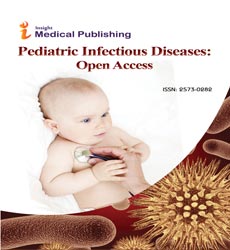Neonatal Hepatitis B Surface Antigenemia Detected Less than 24 Hours Post Immunization
Laila Obaid, Adnan Mohamed Al Ali , Ahmed Sarheed
DOI10.21767/2573-0282.100040
Laila Obaid*, Adnan Mohamed Al Ali and Ahmed Sarheed
Mafraq Hospital, NICU, Abu Dhabi, United Arab Emirates
- *Corresponding Author:
- Laila Obaid
Department of Paediatrics, Mafraq Hospital, NICU, Abu Dhabi, United Arab Emirates
Tel: +97125011425
E-mail: laobaid@seha.ae
Received date: December 26, 2016; Accepted date: March 20, 2017; Published date: March 31, 2017
Citation: Obaid L, Ali A, Sarheed A (2017) Neonatal Hepatitis B Surface Antigenemia Detected Less than 24 Hours Post Immunization. Pediatric Infect Dis 2:40. doi: 10.21767/2573-0282.100040
Keywords
Neonatal hepatitis B surface antigenemia; Perinatal hepatitis B virus; Hepatitis B immune globulin
Introduction
Perinatal hepatitis B virus (HBV) infection occurs during delivery from an infected mother; it is associated with few or no symptoms at birth, but has a high risk of chronic subclinical disease in later childhood or adulthood [1]. Up to 90% of infants infected perinatally will develop chronic infection. The risk of transmission is 70 to 90% from women seropositive for hepatitis B surface antigen (HBsAg) and hepatitis B antigen at the time of delivery. Prenatal HBsAg screening is routinely offered early in the pregnancy or at delivery if the mother HBV status is unknown [2]. Full term new-born born to mothers with unknown HBV status should receive the HBV vaccine soon after birth and HBV immunoglobulin (HBIG) if mother HBsAg is positive. The combination of HBV vaccine and HBIG is 85 to 95 percent effective in reducing HBV infection from vertical transmission when given within 12 h of birth [1]. Transient HBsAg antigenemia has been reported post HBV immunization, with HBsAg being detected as early as 24 h, most often at 2-6 days and up to 2 to 3 weeks following immunization [3]. In this case report, we describe the development of neonatal HBsAg antigenemia less than 24 h post administration of the HBV vaccine to a term infant.
Case Report
A full term male infant was born to multi- gravida mother with inadequate antenatal care, by uncomplicated spontaneous vaginal delivery. Infant birth weight 2920 g. The mother HBsAg status was unknown to the care team at delivery. Infant received vaccine at 6 h of age. Both mother and infant were screened for HBV infection. The maternal HBsAg screen was negative, but the infant screen was positive at 16 h of age. Due to concern for possible false negative initial maternal screen, the mother and infant were retested for HBsAg and HBs antibodies (AB). Infant received HBIG. The repeated screen confirm maternal negative HBsAg status but infant screen was positive for HBsAg and negative for HBs and HBcore antibodies, confirming post immunization HBs Ag antigenemia. To our knowledge this is the first report of neonatal HBs Ag antigenemia occurring in less than 24 h post immunization.
Conclusion
Neonatal HBsAg antigenemia can be detected as early as 16 h post immunization. We recommend that, if a new-born screen for HBsAg is required, the test should be performed prior to administration of HBV vaccine to avoid unnecessary parental concern and lab investigation.
References
- Kimberlin DW, Brady MT, Jackson MA, Long SS (2015) Report of the Committee on Infectious Diseases; American Academy of Pediatrics, Illinois, USA, pp. 402-403
- www.haad.ae
- Koksal N, Altinkaya N, Perk Y (1996) Transient hepatitis B surface antigenemia after neonatal hepatitis B immunization. ActaPaediatr85:1501-1502.
Open Access Journals
- Aquaculture & Veterinary Science
- Chemistry & Chemical Sciences
- Clinical Sciences
- Engineering
- General Science
- Genetics & Molecular Biology
- Health Care & Nursing
- Immunology & Microbiology
- Materials Science
- Mathematics & Physics
- Medical Sciences
- Neurology & Psychiatry
- Oncology & Cancer Science
- Pharmaceutical Sciences
